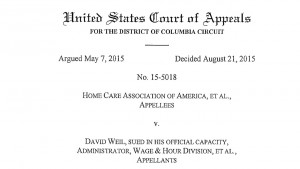US Court of Appeals overturns District Court Ruling on Overtime Exemption
On August 21, 2015, the United States Court of Appeals for The District of Columbia issued its ruling on the  suit brought by The Home Care Association of America, The National Association for Home Care & Hospice, and the International Franchise Association.
suit brought by The Home Care Association of America, The National Association for Home Care & Hospice, and the International Franchise Association.
This court action was based on a change in the way the US Department of Labor interpreted the overtime exemptions in the Fair Labor Standards Act. Prior to the rule change, home care workers were exempt from minimum wage and overtime.
The Appeals Court Ruling
Here is an excerpt from the ruling issued by the court:
“Until recently, the Department of Labor interpreted the statutory exemptions for companionship services and live-in workers to include employees of third-party providers. The Department instituted that interpretation at a time when the provision of professional care primarily took place outside the home in institutions such as hospitals and nursing homes. Individuals who provided services within the home, on the other hand, largely played the role of an “elder sitter” giving basic help with daily functions as an on-site attendant.
Since the time the Department initially adopted that approach, the provision of residential care has undergone a marked transformation. The growing demand for long-term home care services and the rising cost of traditional institutional care have fundamentally changed the nature of the home care industry. Individuals with significant care needs increasingly receive services in their homes rather than in institutional settings. And correspondingly, residential care increasingly is provided by professionals employed by third-party agencies rather than by workers hired directly by care recipients and their families.
In response to those developments, the Department recently adopted regulations reversing its position on whether the FLSA’s companionship-services and live-in worker exemptions should reach employees of third-party agencies who are assigned to provide care in a home. The new regulations remove those employees from the exemptions and bring them within the Act’s minimum-wage and overtime protections. The regulations thus give those employees the same FLSA protections afforded their counterparts who provide largely the same services in an institutional setting.
Appellees, three associations of home care agencies, challenged the Department’s extension of the FLSA’s minimum-wage and overtime provisions to employees of third-party agencies who provide companionship services and live-in care within the home. The district court invalidated the Department’s new regulations, concluding that they contravene the terms of the FLSA exemptions. We Disagree. (Emphasis added)
The Supreme Court’s decision in Long Island Care at Home, Ltd. v. Coke, 551 U.S. 158 (2007) confirms that the Act vests the Department with discretion to apply (or not apply) the companionship-services and live-in exemptions to employees of third-party agencies. The Department’s decision to extend the FLSA’s protections to those employees is grounded in a reasonable interpretation of the satatute and is neither arbitrary nor capricious. We therefore reverse the district court and remand for the grant of summary judgement to the Department. “
Writing for a unanimous three-judge panel, Judge Sri Srinivasan cited a “dramatic transformation” of the home care industry over the past four decades as a valid reason for the change. He also noted a massive shift to providing care for the elderly in their own homes rather than in nursing homes, which requires workers to offer more advanced medical care and assistance to clients than the mere “companionship” services envisioned in 1974.
Click here to read the complete court ruling.
What This Means
This ruling means that home care companies providing companionship-services and live-in care will be required to pay minimum wage and overtime to home care workers. The three associations are analyzing the impact of the rule and what the decision will mean for home care providers.
Stay tuned to Private Duty Today for more information updates on this development.




